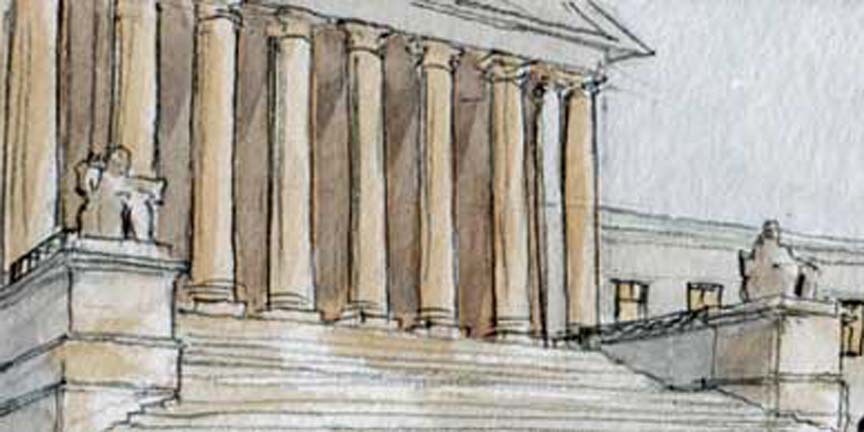Thursday round-up

on Nov 7, 2019 at 6:56 am

David Savage reports for the Los Angeles Times that “Supreme Court justices, both conservative and liberal, appeared skeptical Wednesday of a Trump administration argument” in County of Maui, Hawaii v. Hawaii Wildlife Fund “that the federal Clean Water Act should not apply to sewage plant wastewater that flows into the ground and eventually seeps into federally protected waters, such as rivers or oceans.” At Bloomberg, Greg Stohr reports that, “[a]mid references to Agatha Christie murder mysteries and a party guest who spikes the punch bowl, the justices tried to avoid either giving large polluters an easy way to skirt regulation or subjecting individual homeowners to burdensome requirements.” Additional coverage comes from Nina Totenberg at NPR (audio), Pamela King at E&E News, and Ellen Gilmer at Bloomberg Environment, who reports that “[l]egal experts saw the arguments as a mixed bag for both sides.” The editorial board of The Wall Street Journal (subscription required) urges the justices to “do a public and legal service by stating clearly that current law excludes groundwater, and the only way to change that is by passing a new law through Congress.” [Disclosure: Goldstein & Russell, P.C., whose attorneys contribute to this blog in various capacities, is counsel on an amicus brief in support of the respondents in this case.]
Ronald Mann analyzes yesterday’s argument in Retirement Plans Committee of IBM v. Jander, in which the justices considered whether ERISA plaintiffs can state a claim for breach of a duty of prudence by making general allegations that the costs of undisclosed fraud grow over time, for this blog. At Bloomberg Law, Jacklyn Wille reports that “[a] battle over the company stock in International Business Machines Corp.’s 401(k) plan led the justices … to grapple with how federal securities law interacts with ERISA—though not all justices appeared to welcome the discussion.”
Jayesh Rathod has this blog’s analysis of Monday’s oral argument in Barton v. Barr, in which the justices considered whether a green-card holder who is not seeking admission to the U.S. can be “rendered inadmissible” so as to stop the clock on accumulating a long enough period of continuous residence to be eligible for relief from deportation. Joel Goldstein analyzes Tuesday’s argument in CITGO Asphalt Refining Co. v. Frascati Shipping Co., Ltd., which asks whether, under federal maritime law, a safe-berth clause in a voyage-charter contract is a guarantee of a ship’s safety or imposes a duty of due diligence, for this blog. [Disclosure: Goldstein & Russell, P.C., whose attorneys contribute to this blog in various capacities, is among the counsel to the respondents in this case.] This blog’s analysis of Tuesday’s argument in Allen v. Cooper, which asks whether the Constitution gives Congress power to revoke the states’ immunity from suit for copyright infringement, comes from Howard Wasserman.
Briefly:
- For the Houston Chronicle, Keri Blakinger reports that Bobby James Moore, “[t]he Houston man whose death penalty case upended how Texas courts determine intellectual disability[,] will no longer face the possibility of execution, instead winning a life sentence after nearly four decades on death row” and two victories in the Supreme Court.
- In an op-ed for The New York Times, Linda Greenhouse writes that the court’s decision in Department of Homeland Security v. Regents of the University of California, a challenge to the government’s decision to terminate the DACA program, will “be important in defining the court’s relationship to a president who behaves as if he has the Supreme Court in his pocket,” because “[it] will indicate whether the Roberts court — more specifically, the chief justice himself — will continue to insist on believable explanations from an administration that often appears incapable of giving one.”
- At the Federalist Society blog, Elizabeth Slattery reviews Justice Neil Gorsuch’s recent book, “A Republic, If You Can Keep It,” which “offers insight into how the Justice puts his commitment to originalism, textualism, and judicial restraint into practice.”
We rely on our readers to send us links for our round-up. If you have or know of a recent (published in the last two or three days) article, post, podcast or op-ed relating to the Supreme Court that you’d like us to consider for inclusion in the round-up, please send it to roundup [at] scotusblog.com. Thank you!


